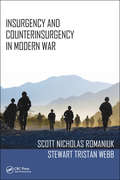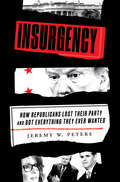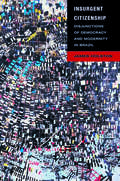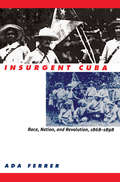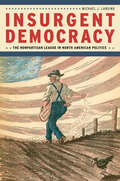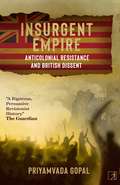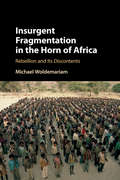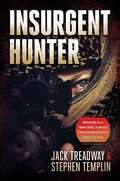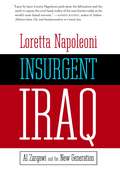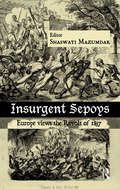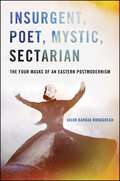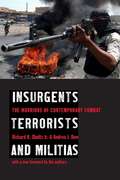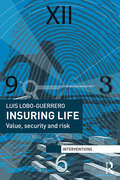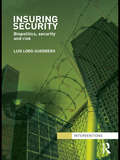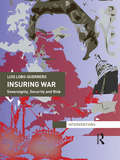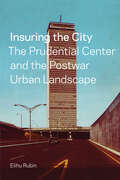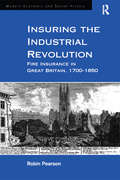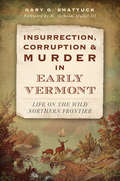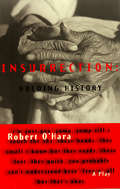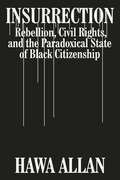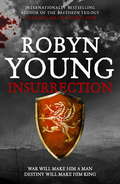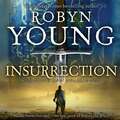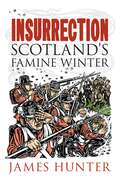- Table View
- List View
Insurgency and Counterinsurgency in Modern War
by Scott Nicholas Romaniuk Stewart Tristan WebbA collection of original works covering all aspects of insurgency and counterinsurgency through a multinational lens, Insurgency and Counterinsurgency in Modern War addresses the need to look beyond the United States and other prominent counterinsurgency actors in the contemporary world. It addresses the need to look beyond the United States and other preeminent counterinsurgency actors in the contemporary world while reassessing some of the latent and burgeoning insurgent organizations and networks around the globe. It also suggests alternative approaches to understanding insurgency, counterinsurgency, and conventional and asymmetric warfare as they relate to insurgency and counterinsurgency.
Insurgency: How Republicans Lost Their Party and Got Everything They Ever Wanted
by Jeremy W. PetersHow did the party of Lincoln become the party of Trump? From an acclaimed political reporter for The New York Times comes the definitive story of the mutiny that shattered American politics.&“A bracing account of how the party of Lincoln and Reagan was hijacked by gadflies and grifters who reshaped their movement into becoming an anti-democratic cancer that attacked the U.S. Capitol.&”—Joe ScarboroughJeremy W. Peters&’s epic narrative chronicles the fracturing of the Republican Party. Insurgency is a fantasia-like story of a party establishment that believed it could control the dark energy it helped foment—right up until it suddenly couldn&’t. How, Peters asks, did conservative values that Republicans claimed to cherish, like small government, fiscal responsibility, and morality in public service, get completely eroded as an unshakable faith in Donald Trump grew to define the party?The answer is a tale traced across three decades—with new reporting and firsthand accounts from the people who were there—of populist uprisings that destabilized the party. The signs of conflict were plainly evident for anyone who cared to look. After Barack Obama&’s election convinced many Republicans that they faced an existential demographics crossroads, many believed the only way to save the party was to create a more inclusive and diverse coalition. But party leaders underestimated the energy and popular appeal of those who would pull the party in the opposite direction. They failed to see how the right-wing media they hailed as truth-telling was warping the reality in which their voters lived. And they did not understand the complicated moral framework by which many conservatives would view Trump, leading evangelicals and one-issue voters to shed Republican orthodoxy if it delivered a Supreme Court that would undo Roe v. Wade.In this sweeping history, Peters details key junctures and episodes to unfurl the story of a revolution from within. Its architects had little interest in the America of the new century but a deep understanding of the iron will of a shrinking minority. With Trump as their polestar, their gamble paid greater dividends than they&’d ever imagined, extending the life of far-right conservatism in United States domestic policy into the next half century.
Insurgent Citizenship: Disjunctions Of Democracy And Modernity In Brazil (In-formation Ser.)
by James Holston<P>Insurgent citizenships have arisen in cities around the world. <P>This book examines the insurgence of democratic citizenship in the urban peripheries of São Paulo, Brazil, its entanglement with entrenched systems of inequality, and its contradiction in violence.<P> James Holston argues that for two centuries Brazilians have practiced a type of citizenship all too common among nation-states--one that is universally inclusive in national membership and massively inegalitarian in distributing rights and in its legalization of social differences.<P> But since the 1970s, he shows, residents of Brazil's urban peripheries have formulated a new citizenship that is destabilizing the old.<P> Their mobilizations have developed not primarily through struggles of labor but through those of the city--particularly illegal residence, house building, and land conflict. <P>Yet precisely as Brazilians democratized urban space and achieved political democracy, violence, injustice, and impunity increased dramatically.<P> Based on comparative, ethnographic, and historical research, Insurgent Citizenship reveals why the insurgent and the entrenched remain dangerously conjoined as new kinds of citizens expand democracy even as new forms of violence and exclusion erode it.<P> Rather than view this paradox as evidence of democratic failure and urban chaos, Insurgent Citizenship argues that contradictory realizations of citizenship characterize all democracies--emerging and established. <P>Focusing on processes of city- and citizen-making now prevalent globally, it develops new approaches for understanding the contemporary course of democratic citizenship in societies of vastly different cultures and histories.
Insurgent Collective Action and Civil War in El Salvador
by Elisabeth Jean WoodWidespread support among rural people for the leftist insurgency during the civil war in El Salvador challenges conventional interpretations of collective action. Those who supplied tortillas, information, and other aid to guerillas took mortal risks and yet stood to gain no more than those who did not. Wood's rich tapestry of explanation is based on oral histories gathered from peasants who supported the insurgency and those who did not over a period of many years during and immediately following the war, and interviews with military commanders of both sides. Peasants supported the FMLN, Wood found, not for any material gain that was contingent on their participation, but rather for moral and emotional reasons. Wood's alternative model places emotions and morals, as well as conventional interests, at the heart of collective action.
Insurgent Cuba
by Ada FerrerIn the late nineteenth century, in an age of ascendant racism and imperial expansion, there emerged in Cuba a movement that unified black, mulatto, and white men in an attack on Europe's oldest empire, with the goal of creating a nation explicitly defined as antiracist. This book tells the story of the thirty-year unfolding and undoing of that movement. Ada Ferrer examines the participation of black and mulatto Cubans in nationalist insurgency from 1868, when a slaveholder began the revolution by freeing his slaves, until the intervention of racially segregated American forces in 1898. In so doing, she uncovers the struggles over the boundaries of citizenship and nationality that their participation brought to the fore, and she shows that even as black participation helped sustain the movement ideologically and militarily, it simultaneously prompted accusations of race war and fed the forces of counterinsurgency.Carefully examining the tensions between racism and antiracism contained within Cuban nationalism, Ferrer paints a dynamic portrait of a movement built upon the coexistence of an ideology of racial fraternity and the persistence of presumptions of hierarchy.
Insurgent Democracy: The Nonpartisan League in North American Politics
by Michael J. LansingIn 1915, western farmers mounted one of the most significant challenges to party politics America has seen: the Nonpartisan League, which sought to empower citizens and restrain corporate influence. Before its collapse in the 1920s, the League counted over 250,000 paying members, spread to thirteen states and two Canadian provinces, controlled North Dakota's state government, and birthed new farmer-labor alliances. Yet today it is all but forgotten, neglected even by scholars. Michael J. Lansing aims to change that. Insurgent Democracy offers a new look at the Nonpartisan League and a new way to understand its rise and fall in the United States and Canada. Lansing argues that, rather than a spasm of populist rage that inevitably burned itself out, the story of the League is in fact an instructive example of how popular movements can create lasting change. Depicting the League as a transnational response to economic inequity, Lansing not only resurrects its story of citizen activism, but also allows us to see its potential to inform contemporary movements.
Insurgent Empire: Anticolonial Resistance and British Dissent
by Priyamvada GopalHow rebellious colonies changed British attitudes to empire Insurgent Empire shows how Britain&’s enslaved and colonial subjects were active agents in their own liberation. What is more, they shaped British ideas of freedom and emancipation back in the United Kingdom. Priyamvada Gopal examines a century of dissent on the question of empire and shows how British critics of empire were influenced by rebellions and resistance in the colonies, from the West Indies and East Africa to Egypt and India. In addition, a pivotal role in fomenting resistance was played by anticolonial campaigners based in London, right at the heart of empire. Much has been written on how colonized peoples took up British and European ideas and turned them against empire when making claims to freedom and self-determination. Insurgent Empire sets the record straight in demonstrating that these people were much more than victims of imperialism or, subsequently, the passive beneficiaries of an enlightened British conscience—they were insurgents whose legacies shaped and benefited the nation that once oppressed them.
Insurgent Fragmentation in the Horn of Africa: Rebellion and its Discontents
by Michael WoldemariamWhen insurgent organizations factionalize and fragment, it can profoundly shape a civil war: its intensity, outcome, and duration. In this extended treatment of this complex and important phenomenon, Michael Woldemariam examines why rebel organizations fragment through a unique historical analysis of the Horn of Africa's civil wars. Central to his view is that rebel factionalism is conditioned by battlefield developments. While fragmentation is caused by territorial gains and losses, counter-intuitively territorial stalemate tends to promote rebel cohesion and is a critical basis for cooperation in war. As a rare effort to examine these issues in the context of the Horn of Africa region, based upon extensive fieldwork, this book will interest both scholarly and non-scholarly audiences interested in insurgent groups and conflict dynamics.
Insurgent Hunter: Memoirs of a Navy SEAL Turned Counterinsurgent Agent in Iraq
by Stephen Templin Jack TreadwayWhen you hunt men, men will hunt you.In this epic thrill ride filled with triumph and tragedy, Jack Treadway takes readers deep into the shadows of covert warfare. As a new SEAL learning to hunt men, a clandestine mini wet submarine comes within inches of slicing and dicing him. In SEAL Team Five, he shuffles through a vomit-spewed C-130 transport plane to jump into something worse—a treacherous snowy mountain in the Korean peninsula. Then he breaks his back in a Special Mission Unit assignment and breaks away from the SEAL Teams. Jack stalks deeper into the darkness from SEAL to Office of Special Investigations (OSI) counterintelligence officer in Iraq. His most elusive prey is a high value target on the kill or capture list—an al Qaeda financier codenamed Kaiser Soze. Jack and his team remove more than a hundred enemy insurgents from the battle space. When a high-ranking Iraqi ally—who secretly works for Iran—kills three members of Jack&’s team, he wants bloody revenge.
Insurgent Iraq: Al Zarqawi and the New Generation
by Loretta Napoleoni Jason Burke Nick FieldingAn unparalleled look into the Iraqi insurgency and the multitude of forces that continue to shape it, Insurgent Iraq: Al-Zarqawi and the New Generation presents a chilling account of the regrouping of terror networks, and the development of an Iraqi resistance since the invasion by coalition forces over two years ago. One of the world's leading specialists on terrorism, economist Loretta Napoleoni is uniquely qualified to make sense of the ways in which terror networks do and do not operate in Iraq, and what role they play in the Iraqi resistance. Is the insurgency in Iraq a counter-Crusade, a national liberation movement, or a civil war? With a complex understanding of all the intricacies inherent in such a question, Napoleoni provides a mindful discussion, offering a much-needed understanding of how the US occupation of Iraq has catalyzed the cultural, religious, and political divides within the country to create a wholly changed, more volatile landscape. Composed of independent Iraqi Jihadist groups, Islamo-Nationalist and Ba'ath party resistance, ethnic infighting between Sunni, Shi'ite and Kurd, and foreign suicide bombers, the resistance is a divided yet maintains one demand: the end of US occupation. Overall, Napoleoni offers a breakdown of the current political landscape in Iraq, and a renovated al-Qaeda. Insurgent Iraq is a necessary read for anyone concerned with the future of Iraq, or seeking greater insight into the U.S.'s critical role in the Middle East.
Insurgent Sepoys: Europe Views the Revolt of 1857
by Shaswati MazumdarThe Revolt of 1857 in India has so far largely been viewed as an event that was of interest to British and Indian scholars investigating the various consequences of British colonial rule in India. What has remained out of the focus of study during the last 150 years is the possible impact of the Revolt elsewhere, its so to say international dimension: what, in particular, was the reaction in Europe where elemental social and political transformations were underway. Whatever the varied nature of the reactions, the space given to the Revolt in many European newspapers and journals while it was in progress is certainly extensive. What is more, representations of and reflections on the Revolt appeared both during the event and for long after its suppression, above all in forms of popular fiction but also in historical accounts, letters, reminiscences and other forms of writing. The collection of essays in this volume ventures into this unexplored terrain and offers a first look at some of these European responses.
Insurgent, Poet, Mystic, Sectarian: The Four Masks of an Eastern Postmodernism (SUNY series in Global Modernity)
by Jason Bahbak MohagheghThe insurgent, the poet, the mystic, the sectarian: these are four modes of subjectivity that have emerged amid Middle Eastern thought's attempt to reverse, dethrone, or supersede modernity. Providing a theoretical overview of each of these existential stances, Jason Bahbak Mohaghegh engages the views of thinkers and artists of the last several decades, primarily from Iran, but also from Arab, Turkish, North African, Armenian, Afghani, Chechen, and Kurdish backgrounds. He explores various dimensions of the Middle Eastern experience at the threshold of the postmodern moment, including revolutionary ideology, avant-garde literature, new-wave cinema, and radical-extremist thought. The profound reinvention of concepts characteristic of such work—fatalism, insurrection, disappearance, siege—provide unique interpretations and confrontations with the modern period and its relationship to those who presumably fall outside its boundaries of self-consciousness. Expanding the conversation, Mohaghegh contrasts the impressions of the Middle Eastern figures considered with those of the most incisive Western thinkers of modernity, such as Nietzsche, Heidegger, and Baudrillard, to offer an original global vision that crosses the East-West divide.
Insurgents, Terrorists, and Militias: The Warriors of Contemporary Combat
by Richard Shultz Jr. Andrea DewSince the end of the Cold War, conventional militaries and their political leaders have confronted a new, brutal type of warfare in which non-state armed groups use asymmetrical tactics to successfully fight larger, technologically superior forces. In order to prevent future bloodshed and political chaos, it is crucial to understand how these unconventional armed groups think and to adapt to their methods of combat.Richard H. Shultz Jr. and Andrea J. Dew investigate the history and politics of modern asymmetrical warfare. By focusing on four specific hotbeds of instability—Somalia, Chechnya, Afghanistan, and Iraq—Shultz and Dew conduct a careful analysis of tribal culture and the value of clan associations. They examine why these "traditional" or "tribal" warriors fight, how they recruit, where they find sanctuary, and what is behind their strategy. Traveling across two centuries and several continents, Shultz and Dew examine the doctrinal, tactical, and strategic advantages and consider the historical, cultural, and anthropological factors behind the motivation and success of the warriors of contemporary combat.In their provocative argument, Shultz and Dew propose that war in the post-Cold War era cannot be waged through traditional Western methods of combat, especially when friendly states and outside organizations like al-Qaeda serve as powerful allies to the enemy. Thoroughly researched and highly readable, Insurgents, Terrorists, and Militias examines how non-state armies fight, identifies the patterns and trends of their combat, and recommends how conventional militaries can defeat these irregular yet highly effective organizations.
Insurgents, Terrorists, and Militias: The Warriors of Contemporary Combat
by Andrea J. Dew Richard H. Shultz Jr.Since the end of the Cold War, conventional militaries and their political leaders have confronted a new, brutal type of warfare in which non-state armed groups use asymmetrical tactics to successfully fight larger, technologically superior forces. In order to prevent future bloodshed and political chaos, it is crucial to understand how these unconventional armed groups think and to adapt to their methods of combat. Richard H. Shultz Jr. and Andrea J. Dew investigate the history and politics of modern asymmetrical warfare. By focusing on four specific hotbeds of instability-Somalia, Chechnya, Afghanistan, and Iraq-Shultz and Dew conduct a careful analysis of tribal culture and the value of clan associations. They examine why these "traditional" or "tribal" warriors fight, how they recruit, where they find sanctuary, and what is behind their strategy. Traveling across two centuries and several continents, Shultz and Dew examine the doctrinal, tactical, and strategic advantages and consider the historical, cultural, and anthropological factors behind the motivation and success of the warriors of contemporary combat. In their provocative argument, Shultz and Dew propose that war in the post-Cold War era cannot be waged through traditional Western methods of combat, especially when friendly states and outside organizations like al-Qaeda serve as powerful allies to the enemy. Thoroughly researched and highly readable, Insurgents, Terrorists, and Militias examines how non-state armies fight, identifies the patterns and trends of their combat, and recommends how conventional militaries can defeat these irregular yet highly effective organizations.
Insuring Life: Value, Security and Risk (Interventions)
by Luis Lobo-GuerreroThis book is a contribution to the scholarly engagement with the wider problem of governing through risk and the politics of uncertainty. It takes life insurance as an empirical site from which to ask: what is the kind of governance created through insurance an instance of, and how does it contribute to the transcendence of liberalism? By making a distinction between capable life as object of insurance, and potential life as that which escapes its control, the book conducts a historical epistemological analysis of the problems of valuation, truth production, securitisation, classification, and gendering that constitute life insurance products and practices. Insuring Life offers a critical engagement with the epistemology of life insurance to demonstrate the unnecessary and precarious character of the conditions that make this instrument of liberal governance possible. It concludes that the transcendence of liberalism relies on the technological agency of these instruments and that its challenge begins by redefining the terms under which the potential of life, if invaluable, is to be thought as event. The book follows Insuring War as the third of a trilogy that analyses how concepts and practices of power, risk and security materialise in the form of insurance as a central instrument of governance in the liberal world. It will be of great use to scholars, researchers, and postgraduate students of political economy, critical security studies and political theory, the biopolitics of security and post-structural politics. Insuring War: https://www.routledge.com/products/search?keywords=insuring+war Insuring Security: https://www.routledge.com/Insuring-Security-Biopolitics-security-and-risk/Lobo-Guerrero/p/book/9780415522854
Insuring Security: Biopolitics, security and risk (Interventions)
by Luis Lobo-GuerreroInsurance is the world’s largest economic industry, providing a form of security that more than triples global defence expenditure. However, little is know about the form of security insurance provides. This book offers a genealogical interrogation of the relationship between security and risk through its materialisation in insurance. This work seeks to argue that insurance practices ascribe value to life and in so doing produce a form of security central to the understanding of contemporary liberal governance and security. Lobo-Guerrero theorizes insurance as a biopolitical effect that results from the continuous interaction of an ‘entrepreneurial form of power’, and traditional forms of sovereign security. Through rich empirical cases and a unique theorization, the book breaks apart the traditional division between security studies, political economy and political theory. The author explores this theory in relation to specific issues such as the use of life insurance in the molecular age, the use of insurance to securitize against environmental catastrophic risk, specialist products such as kidnap and ransom insurance, as well as the use of insurance to counter maritime piracy in the twenty-first century. Providing an important and original contribution to the study of the biopolitics of security, this work will be of great interest to all scholars of security studies, international relations and international political economy. Insuring War: https://www.routledge.com/products/search?keywords=insuring+war Insuring Life: https://www.routledge.com/Insuring-Life-Value-Security-and-Risk/Lobo-Guerrero/p/book/9780415716079
Insuring War: Sovereignty, Security and Risk (Interventions)
by Luis Lobo-GuerreroInsurance is a central, if until now ignored, instrument of war in the modern period. Ever since the eighteenth century, interaction between governments and insurers in Western countries has materialised in the form of war risk schemes that have contributed to the waging of war and the preservation of peace. The operation of those schemes has given rise to a curious, if not innocent, association between practices of statehood and practices of risk, which are theorised here under the label of ‘insurantial sovereignty’. The book draws on the British experience of using maritime insurance as an instrument of war during the Napoleonic Wars, the two World Wars, and the early twenty-first century. It asks, what happens, when, under conditions of war, the sovereign adopts insurantial imaginaries and practices into its rationalities of government? In doing so the book makes a novel contribution to the understanding of liberal security and liberal governance which is central to the theory of Political Science and International Relations, the understanding of international political sociology, and international political economy. The book follows Insuring Security: Biopolitics, Security and Risk as the second of a trilogy that analyses how concepts and practices of power, risk and security materialise in the form of insurance as a central instrument of governance in the liberal world. Insuring Security: https://www.routledge.com/Insuring-Security-Biopolitics-security-and-risk/Lobo-Guerrero/p/book/9780415522854 Insuring Life: https://www.routledge.com/Insuring-Life-Value-Security-and-Risk/Lobo-Guerrero/p/book/9780415716079
Insuring the City: The Prudential Center and the Postwar Urban Landscape
by Elihu RubinAn in-depth look at Boston's Prudential Center and what its story reveals about the evolution of the modern American city The Prudential Center anchors the Boston skyline with its tall, gray tower. It is also a historical beacon, representing a midcentury moment when insurance companies such as Prudential were particularly aware of how their physical presence and civic engagement reflected upon their intangible product: financial security. Looking to New York's Rockefeller Center, the creators of the Prudential Center aspired to use real estate development as a tool toward civic achievement, reinvigorating central Boston and integrating a large complex of buildings with new infrastructure for the automobile. Now available in paperback, this award-winning book tells the full story of “The Pru,” placing it in the political, economic, and architectural contexts of the period, and providing new insights into urban renewal in postwar America.
Insuring the Industrial Revolution: Fire Insurance in Great Britain, 1700–1850 (Modern Economic and Social History)
by Robin PearsonFire had always been one of the greatest threats to an early modern British society that relied on the naked flame as the prime source of heating, lighting and cooking. Yet whilst the danger of fire had always been taken seriously, it was not until the start of the eighteenth century that a sophisticated system of insurance became widely available. Whilst a number of high profile fires during the seventeenth century had drawn attention to the economic havoc a major conflagration could wreak, it was not until the effects of sustained industrialization began to alter the economic and social balance of the nation, that fire insurance really took off as a concept. The culmination of ten years of research, this book is the definitive work on early British fire insurance. It also provides a foundation for future comparative international studies of this important financial service, and for a greater level of theorising by historians about the relationship between insurance, perceptions of risk, economic development and social change. Through a detailed study of the archives of nearly 50 English and Scottish insurance companies founded between 1696 and 1850 - virtually all the records currently available - together with the construction of many new datasets on output, performance and markets, this book presents one of the most comprehensive histories ever written of a financial service. As well as measuring the size, market structure and growth rate of insurance, and the extent to which the first industrial revolution was insured, it also demonstrates ways in which insurance can be linked into wider issues of economic and social change in Britain. These range from an examination of the joint-stock company form of organization - to an analysis of changing attitudes towards fire hazard during the course of the eighteenth century. The book concludes by emphasising the ambivalent character of fire insurance in eighteenth and early nineteenth century Britain, contrasting the industry's dynamic long-run rate of growth with its more conservative attitude to product design and diversification.
Insurrection, Corruption & Murder in Early Vermont: Life on the Wild Northern Frontier
by H. Nicholas Muller III Gary G. ShattuckDuring America's Early Republic, the pastoral villages and forests of Vermont were anything but peaceful. Conflict raged along the Canadian border, as international tensions prompted Thomas Jefferson to ban American exports to France and Great Britain. Some Vermonters turned to smuggling. Federal seizure of a boat called the "Black Snake" went deadly wrong--three men were killed that day, and another died later in the state's first hanging execution. The outbreak of the War of 1812 brought thousands of troops, along with drunkenness, disease and a general disregard of civil rights, including the imposition of extra-legal military trials. Using his extensive knowledge of the law, author Gary Shattuck sheds new light on this riotous era.
Insurrection: Holding History
by Robert O HaraThe first publication of Insurrection, a remarkable debut of a major new African-American theatre artist. The playwright won the distinguished Oppenheim Award from Newsday for best new playwright of 1997. Insurrection is a chilling exploration of the roots of the Nat Turner slave insurrection through the eyes of a contemporary black man who is transported back through time with his grandfather.
Insurrection: Rebellion, Civil Rights, And The Paradoxical State Of Black Citizenship
by Hawa AllanA brilliant debut by lawyer and critic Hawa Allan on the paradoxical state of black citizenship in the United States. The little-known and under-studied 1807 Insurrection Act was passed to give the president the ability to deploy federal military forces to fend off lawlessness and rebellion, but it soon became much more than the sum of its parts. Its power is integrally linked to the perceived threat of black American equity in what lawyer and critic Hawa Allan demonstrates is a dangerous paradox. While the Act was initially used to repress rebellion against slavery, during Reconstruction it was invoked by President Grant to quell white-supremacist uprisings in the South. During the civil rights movement, it enabled the protection of black students who attended previously segregated educational institutions. Most recently, the Insurrection Act has been the vehicle for presidents to call upon federal troops to suppress so-called “race riots” like those in Los Angeles in 1992, and for them to threaten to do so in other cases of racial justice activism. Yet when the US Capitol was stormed in January 2021, the impulse to restore law and order and counter insurrectionary threats to the republic lay dormant. Allan’s distinctly literary voice underscores her paradigm-shifting reflections on the presence of fear and silence in history and their shadowy impact on the law. Throughout, she draws revealing insight from her own experiences as one of the only black girls in her leafy Long Island suburb, as a black lawyer at a predominantly white firm during a visit from presidential candidate Barack Obama, and as a thinker about the use and misuse of appeals to law and order. Elegant and profound, deeply researched and intensely felt, Insurrection is necessary reading in our reckoning with structural racism, government power, and protest in the United States.
Insurrection: Robert The Bruce, Insurrection Trilogy Book 1 (Insurrection Trilogy #Bk. 3)
by Robyn YoungThe first book in the Insurrection trilogy, which tells the thrilling story of Robert the Bruce.1286 A.D. Scotland is in the grip of the worst winter in living memory. Some say the Day of Judgement has arrived.The King of Scotland rides out from Edinburgh into the stormy night. On the road he is murdered by one of his own men, leaving the succession to the throne wide open. Civil war threatens as the powerful Scottish families jostle for power, not knowing that King Edward I of England has set his own plans for conquest in motion.But all is not destined to go Edward's way. Through the ashes of war, through blood feuds and divided loyalties, a young squire will rise to defy England's greatest king. His name is Robert Bruce. Insurrection is the first in an addictive and action-packed trilogy in the tradition of Conn Iggulden, Bernard Cornwell and Manda Scott.
Insurrection: Robert The Bruce, Insurrection Trilogy Book 1 (Insurrection Trilogy)
by Robyn Young1286 A.D. Scotland is in the grip of the worst winter in living memory. Some say the Day of Judgement has arrived. The King of Scotland rides out from Edinburgh into the stormy night. On the road he is murdered by one of his own men, leaving the succession to the throne wide open. Civil war threatens as the powerful Scottish families jostle for power, not knowing that King Edward I of England has set his own plans for conquest in motion. But all is not destined to go Edward's way. Through the ashes of war, through blood feuds and divided loyalties, a young squire will rise to defy England's greatest king. His name is Robert Bruce. Insurrection is the first in an addictive and action-packed trilogy in the tradition of Conn Iggulden, Bernard Cornwell and Manda Scott.(P)2010 Hodder & Stoughton Audiobooks
Insurrection: Scotland's Famine Winter
by James HunterThe author of On the Other Side of Sorrow gives a detailed account of the causes and effects of the Scottish potato famine that began in 1846. When Scotland&’s 1846 potato crop was wiped out by blight, the country was plunged into crisis. In the Hebrides and the West Highlands, a huge relief effort came too late to prevent starvation and death. Farther east, meanwhile, towns and villages from Aberdeen to Wick and Thurso protested the cost of the oatmeal that replaced potatoes as the people&’s basic foodstuff. Oatmeal&’s soaring price was blamed on the export of grain by farmers and landlords cashing in on even higher prices elsewhere. As a bitter winter gripped and families feared a repeat of the calamitous famine then ravaging Ireland, grain carts were seized, ships boarded, harbors blockaded, a jail forced open, and the military confronted. The army fired on one set of rioters. Savage sentences were imposed on others. But crowds of thousands also gained key concessions. Above all they won cheaper food. Those dramatic events have long been ignored or forgotten. Now, in James Hunter, they have their historian. The story he tells is, by turns, moving, anger-making, and inspiring. In an era of food banks and growing poverty, it is also very timely.Praise for Insurrection&“Hunter never forgets that history is first of all narrative—and this book is rich in stories—or that is subject is the experience of individual men and women, creatures of flesh and blood, not abstractions. Insurrection is fascinating reading, both painful and uplifting.&” —Allan Massie, the Scotsman (UK)
